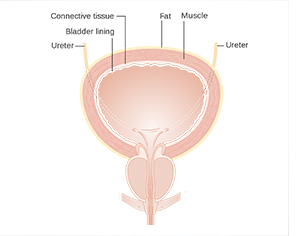
Cystectomy is a surgery that is done to remove the urinary bladder. In men, removing the entire bladder which is often referred to as ‘radical cystectomy’ typically includes removal of the prostate and seminal vesicles.
However, in women, radical cystectomy also involves the removal of the uterus, ovaries and sometimes part of the vagina. After having the bladder removed, the surgeon also needs to create a urinary diversion in order to create a new way to store urine and have it leave the body. There are several ways to store and eliminate urine after bladder removal.
Generally, cystectomy is performed to treat either invasive or noninvasive bladder cancer as well as to treat other pelvic tumors such as advanced colon, prostate, and endometrial cancer apart from some noncancerous and benign conditions such as interstitial cystitis and congenital abnormalities.
Eligibility for a Cystectomy
Types Of Cystectomy
Open surgery: This procedure is conducted by a single incision on the abdomen to access the pelvis and bladder.
Minimally invasive surgery: Here the surgeon makes several small incisions on the abdomen where special surgical tools are inserted to access the abdominal cavity.
Robotic surgery: During this type of minimally invasive surgery, the surgeon sits at a console and remotely operates the surgical tools.
What is Cystectomy?
It is a surgery to remove the urinary bladder. It is used to treat invasive or recurrent noninvasive bladder cancer.
Which of the organs are removed in Cystectomy?
In men, it includes removal of the prostate and seminal vesicles. In women, radical cystectomy involves removal of the uterus, ovaries, and part of the vagina.
Is it possible to have a synthetic bladder?
Currently, a completely synthetic bladder is not possible. However, tissue engineering could help to produce a bladder to replace the removed one in the future.
Which tests are required during follow up?
During follow up certain tests that will be done is MRI and PET-CT, routine blood tests such as full blood count and liver and kidney function tests, checking for the development of urinary obstruction and stone formation in the bladder
Types Of Cystectomy
Open surgery: This procedure is conducted by a single incision on the abdomen to access the pelvis and bladder.
Minimally invasive surgery: Here the surgeon makes several small incisions on the abdomen where special surgical tools are inserted to access the abdominal cavity.
Robotic surgery: During this type of minimally invasive surgery, the surgeon sits at a console and remotely operates the surgical tools.
What is Cystectomy?
It is a surgery to remove the urinary bladder. It is used to treat invasive or recurrent noninvasive bladder cancer.
Which of the organs are removed in Cystectomy?
In men, it includes removal of the prostate and seminal vesicles. In women, radical cystectomy involves removal of the uterus, ovaries, and part of the vagina.
Is it possible to have a synthetic bladder?
Currently, a completely synthetic bladder is not possible. However, tissue engineering could help to produce a bladder to replace the removed one in the future.
Which tests are required during follow up?
During follow up certain tests that will be done is MRI and PET-CT, routine blood tests such as full blood count and liver and kidney function tests, checking for the development of urinary obstruction and stone formation in the bladder

Rating :


With over 10 years for being in operations this hospital enjoys its location in South Delhi overseeing the huge green belt extending from hospital till the QutabMinar comp.....

Rating :
Dr. Kalia is taking steps to ensure that all the pros and cons of hair transplant are put forward to the patient that enable him or her to make the correct decision. The patient friendly approach of Dr. Kalia is bringing a revolution i.....

Rating :
Manipal Hospital Whitefield (MHW) is a unit of the renowned Manipal Hospitals network that is known for Quality and Patient care. It is a 280 beds multi-specialty Hospital offering world class services in .....

Rating :



Rating :
Located in the National Capital Region of New Delhi - Aligarh, Varun Trauma & Burn Centre (P) Ltd., a unit of Varun Hospital a Super-Specialty Hospital, is just a 10 minute drive from Aligarh's Railway Station & Bus Stop. Our facility is verified as a L.....

Rating :

Our experts have treated 5 lakh+ patients across 25+ specialties like Cardiac Sciences, Minimal Access and Laparoscopic Surgery, Neurosciences, Urology, Orthopedics, Aesthetics and Reconstructive Surgery and Nephrology. We are a 74 bed.....

Rating :
In the year 1998, Dr. Sunil Chandra Bagchi and Dr. Ratish Ch. Paul founded Susrut Eye Foundation & Research Centre with a motto to eradicate blindness and make this world a beautiful place to those who are still in darkness. They r.....

Rating :
India’s large and diverse population warrants an efficient health care infrastructure that should be accessible to all strata’s of society. Good quality health care should not be a privilege of the elite only. Metro Group.....

Rating :

Rating :
Hospital Profile Description Currently Not Available







Cystectomy is a surgery that is done to remove the urinary bladder. In men, removing the entire bladder which is often referred to as ‘radical cystectomy’ typically includes removal of the prostate and seminal vesicles.
However, in women, radical cystectomy also involves the removal of the uterus, ovaries and sometimes part of the vagina. After having the bladder removed, the surgeon also needs to create a urinary diversion in order to create a new way to store urine and have it leave the body. There are several ways to store and eliminate urine after bladder removal.
Generally, cystectomy is performed to treat either invasive or noninvasive bladder cancer as well as to treat other pelvic tumors such as advanced colon, prostate, and endometrial cancer apart from some noncancerous and benign conditions such as interstitial cystitis and congenital abnormalities.
Eligibility for a Cystectomy
Types Of Cystectomy
Open surgery: This procedure is conducted by a single incision on the abdomen to access the pelvis and bladder.
Minimally invasive surgery: Here the surgeon makes several small incisions on the abdomen where special surgical tools are inserted to access the abdominal cavity.
Robotic surgery: During this type of minimally invasive surgery, the surgeon sits at a console and remotely operates the surgical tools.
What is Cystectomy?
It is a surgery to remove the urinary bladder. It is used to treat invasive or recurrent noninvasive bladder cancer.
Which of the organs are removed in Cystectomy?
In men, it includes removal of the prostate and seminal vesicles. In women, radical cystectomy involves removal of the uterus, ovaries, and part of the vagina.
Is it possible to have a synthetic bladder?
Currently, a completely synthetic bladder is not possible. However, tissue engineering could help to produce a bladder to replace the removed one in the future.
Which tests are required during follow up?
During follow up certain tests that will be done is MRI and PET-CT, routine blood tests such as full blood count and liver and kidney function tests, checking for the development of urinary obstruction and stone formation in the bladder

Rating :


With over 10 years for being in operations this hospital enjoys its location in South Delhi overseeing the huge green belt extending from hospital till the QutabMinar comp.....

Rating :
Dr. Kalia is taking steps to ensure that all the pros and cons of hair transplant are put forward to the patient that enable him or her to make the correct decision. The patient friendly approach of Dr. Kalia is bringing a revolution i.....

Rating :
Manipal Hospital Whitefield (MHW) is a unit of the renowned Manipal Hospitals network that is known for Quality and Patient care. It is a 280 beds multi-specialty Hospital offering world class services in .....

Rating :



Rating :
Located in the National Capital Region of New Delhi - Aligarh, Varun Trauma & Burn Centre (P) Ltd., a unit of Varun Hospital a Super-Specialty Hospital, is just a 10 minute drive from Aligarh's Railway Station & Bus Stop. Our facility is verified as a L.....

Rating :

Our experts have treated 5 lakh+ patients across 25+ specialties like Cardiac Sciences, Minimal Access and Laparoscopic Surgery, Neurosciences, Urology, Orthopedics, Aesthetics and Reconstructive Surgery and Nephrology. We are a 74 bed.....

Rating :
In the year 1998, Dr. Sunil Chandra Bagchi and Dr. Ratish Ch. Paul founded Susrut Eye Foundation & Research Centre with a motto to eradicate blindness and make this world a beautiful place to those who are still in darkness. They r.....

Rating :
India’s large and diverse population warrants an efficient health care infrastructure that should be accessible to all strata’s of society. Good quality health care should not be a privilege of the elite only. Metro Group.....

Rating :

Rating :
Hospital Profile Description Currently Not Available






Not Available
Medtravels ensures bridging the gap and providing accessibility for patients to interact directly with healthcare service providers. We remain committed to connecting all stakeholders across geographies, and focusing on taking Healthcare beyond boundaries.

We are one of the first few organizations in India to be NABH certified. This itself speaks out loud about the services and facilities we provide to our clients while ensuring optimum quality at all aspects.

We ensure to bring you the best in terms of both healthcare quality & affordability. We value our customers so providing the best of services to them at an affordable price is our objective.

We understand that getting the first opinion is the most crucial step towards your healthcare journey and so based on your reports, we provide you consultation(s) or opinion(s) from top-notch doctors & consultants without any charges.

Travelling outside your home country can be a rigorous affair. So, here we are, to guide you through all the necessities such as – Medical Visa, Air Bookings, Accommodation, Air Ambulance, Pharmacy, Medical Loan, Leisure Travel.

We constantly strive to provide our clients with maximum options and so we have global coverage in terms of Healthcare Providers. We provide you hospital options from – INDIA, SINGAPORE, THAILAND, MALAYSIA, TURKEY & the list goes on

Our objective is to work with complete transparency with both our partners & clients. With this motto, we maintain not to charge you for anything. When you come for treatment, you pay the hospital directly.
Not Available